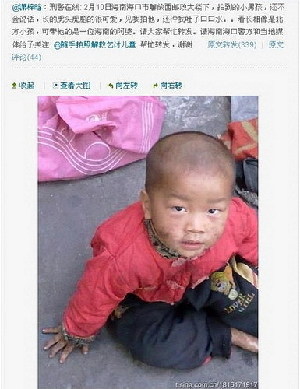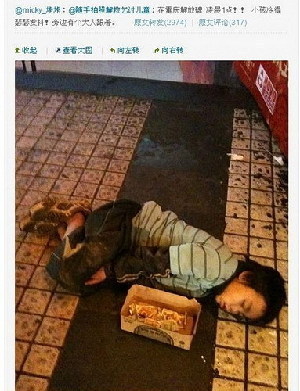Society
Micro blogs save abducted children
By Li Li (China Daily)
Updated: 2011-02-15 07:40
 |
Large Medium Small |
Power of retweeting

Yu started the campaign in the form of a snapshot micro blog, and it has expanded to an online network of more than 220,000 people. They frequently exchange messages and routinely retweet photos of child beggars and missing children, trying to reach as many people as possible.
"It is as easy as lifting a finger, and we might have helped people, why not," Jiang You, 28, said Sunday. A computer engineer from Fujian province, he had just published his snapshot of a 2-year-old child beggar to the network.
"And guess what," he said. "That piece of micro blog of mine was retweeted over 1,500 times within a day. It shows people's hatred for traffickers and compassion for abducted children."
Through Yu's team and tens of thousands of netizens, more than 3,000 tweets with children's pictures and other details were collected and published via the network, with each one retweeted hundreds to thousands of times. "I now have six volunteers helping me with the campaign," Yu told China Daily. "They are based everywhere and they take turns to manage the micro blog."
Yu and his team met over the weekend to discuss operational problems and development plans.
"Whenever we see a micro blog revealing a possible abduction case, we pass on the information to the police for verification," Yu said. "Our volunteers are sorting out all the sources. We will try to set up a child beggar database for further investigation."
At the same time, micro blogs have proved effective at finding missing children.
The beneficiaries
"Without the micro blog, I probably wouldn't see my son again," Peng Gaofeng told China Daily, choking back sobs. The 33-year-old man found his abducted son through a micro blog, and the story has made headlines throughout China.
Peng lost his son, Lele, on March 25, 2008, when a stranger took the 3-year-old forcibly in front of Peng's grocery in Shenzhen. Six surveillance cameras caught images of the man escaping with Lele until they disappeared on a bus, but these clues didn't help Peng and the police track down the kidnapper.
"It is a crime more evil than murder," Peng said.
He put big posters outside his grocery and turned it into a working base for searching for his son. He said he tried working with the police, advertising in newspapers, handing out fliers, offering rewards, protesting on the street with other parents, writing blogs. These attempts attracted attention, but didn't lead to his son - until Deng Fei, a reporter for Phoenix Weekly, tweeted about it and attached Lele's photo.
Deng published this micro blog to his 110,000-plus followers, and it was quickly retweeted more than 5,000 times. Deng said he republished the message and photo on holidays, hoping someone could identify the boy.
Two days before Chinese New Year, a netizen who had seen Lele's picture found a child who looked just like him in Pizhou, Jiangsu province, and he contacted Peng immediately. A few days later, Peng traveled to Pizhou to see the boy. It was, indeed, his son. By that time, Lele had been living with the family that abducted him for three years.
"Everyone can be an investigator with the help of micro-blogging," Peng said.
Reporter Deng live-tweeted the reunion of Peng and his son on Feb 8 and uploaded the reunion video. By 3 pm on Feb 14, the video had been watched more than 470,000 times just on youku.com, one of China's most popular video websites.
|
 Netizens photographed these young beggars in Chongqing (left) and Haikou, capital of Hainan province, and posted their pictures and locations online. [Photos/provided to China Daily]
|
An online sensation
Peng's story took the micro blog campaign to repress child begging and child trafficking to a new level. Everyone was talking about it, on and off the Internet. By 3 pm Monday, more than 760,000 messages about child begging were tweeted on Sina.com's micro blog. Netizens from various cities formed volunteer groups to help child beggars in their areas.
It was so widely discussed that the Ministry of Public Security responded.
"I will use micro-blogging to keep communicating with everyone," Chen Shiqu, director of the ministry's anti-trafficking office, said via his micro blog. "We welcome any crime clues on trafficking and we will carefully check and verify every piece of information."
| 分享按鈕 |
